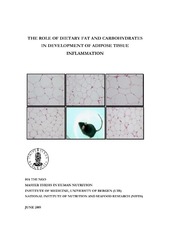| dc.description.abstract | Obesity is considered as a chronic low-grade inflammatory condition, which can be characterized by increased levels of the proinflammatory cytokines such as TNF-α and IL-6, and macrophage infiltration in adipose tissue. Previous studies have reported that fish oil enriched in the polyunsaturated fatty acids (PUFAs) eicosapentaenoic acid (EPA; 20:5n-3) and docosahexaenoic acid (DHA; 22:6n-3) can protect against inflammation in rodents and humans. The aim of this study was to find out whether the type of dietary fat can modulate inflammation. In addition, investigate if the carbohydrate to protein ratio could influence the development of obesity and the inflammatory response. Thirty five male C57BL/6J mice were divided into 5 different groups (n=6) and fed 5 different diets ad libitum. The diets given were; low energy, fish oil + protein, fish oil + sucrose, corn oil + protein, and corn oil + sucrose. Body weight was recorded weekly and feed intake was recorded 3 times a week. The mice were terminated after 10 weeks of feeding, and adipose tissues and blood samples were collected. Gene expression analysis was performed with quantitative real-time PCR (qPCR). Moreover, paraffin-embedded sections of adipose tissue were stained with H&E and examined with a microscope. In addition, plasma parameters were analyzed along with the determination of fatty acid compositions in RBC, liver and adipose tissue. The different methods were performed in order to assess the development of obesity and inflammation, in adipose tissue from mice fed the different diets. The results showed that the anti-inflammatory effect of fish oil was abolished in combination with sucrose in the diet. The fish oil + sucrose group showed significantly higher expression levels of the inflammatory cytokines TNF-α and IL-6, including the macrophage markers F4/80 and CD68 compared to the other treatment groups. Increased adipose tissue mass and hypertrophied adipocytes are presumed to be due to the high-sucrose enrichment in the diets. Sucrose is also considered to be the adipogenic factor, because of its ability to direct fat on to adipose tissue, and attenuate the known positive effects of fish oil. | en_US |
